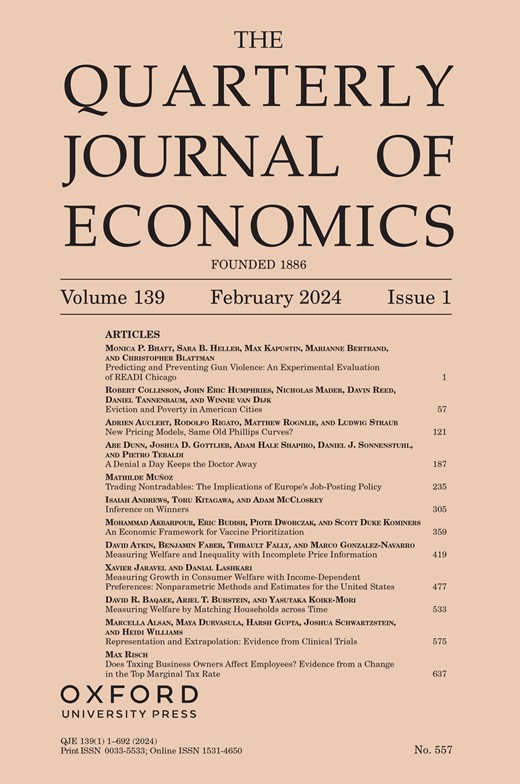信贷紧缩对产出价格动态的影响:企业库存和流动性管理渠道*
IF 12.7
1区 经济学
Q1 ECONOMICS
引用次数: 20
摘要
我研究信贷紧缩如何影响产出价格动态。我构建了一个独特的微观层面数据集,将扫描仪层面的价格和数量与生产商信息相结合,包括生产商的银行关系、库存和现金持有量。我利用雷曼兄弟的失败作为一个准实验,发现面临负信贷供应冲击的公司的产出价格比未受影响的同行下降了约15%。我假设这些公司降低价格以清算库存,并从产品市场产生额外的现金流。我发现这一假设得到了强有力的实证支持:(I)面临负面银行冲击的公司相对于同行暂时降低了价格和库存,增加了市场份额和现金持有量,(ii)这种影响对初始库存高或初始现金持有量小的公司和部门更为强烈。本文章由计算机程序翻译,如有差异,请以英文原文为准。
The Effect of the Credit Crunch on Output Price Dynamics: The Corporate Inventory and Liquidity Management Channel*
I study how a credit crunch affects output price dynamics. I build a unique micro-level data set that combines scanner-level prices and quantities with producer information, including the producer’s banking relationships, inventory, and cash holdings. I exploit the Lehman Brothers failure as a quasi-experiment and find that the firms facing a negative credit supply shock decrease their output prices approximately 15% more than their unaffected counterparts. I hypothesize that such firms reduce prices to liquidate inventory and generate additional cash flow from the product market. I find strong empirical support for this hypothesis: (i) the firms that face a negative bank shock temporarily decrease their prices and inventory and increase their market share and cash holdings relative to their counterparts, and (ii) this effect is stronger for the firms and sectors with a high initial inventory or small initial cash holdings.
求助全文
通过发布文献求助,成功后即可免费获取论文全文。
去求助
来源期刊

Quarterly Journal of Economics
ECONOMICS-
CiteScore
24.20
自引率
2.20%
发文量
42
期刊介绍:
The Quarterly Journal of Economics stands as the oldest professional journal of economics in the English language. Published under the editorial guidance of Harvard University's Department of Economics, it comprehensively covers all aspects of the field. Esteemed by professional and academic economists as well as students worldwide, QJE holds unparalleled value in the economic discourse.
 求助内容:
求助内容: 应助结果提醒方式:
应助结果提醒方式:


